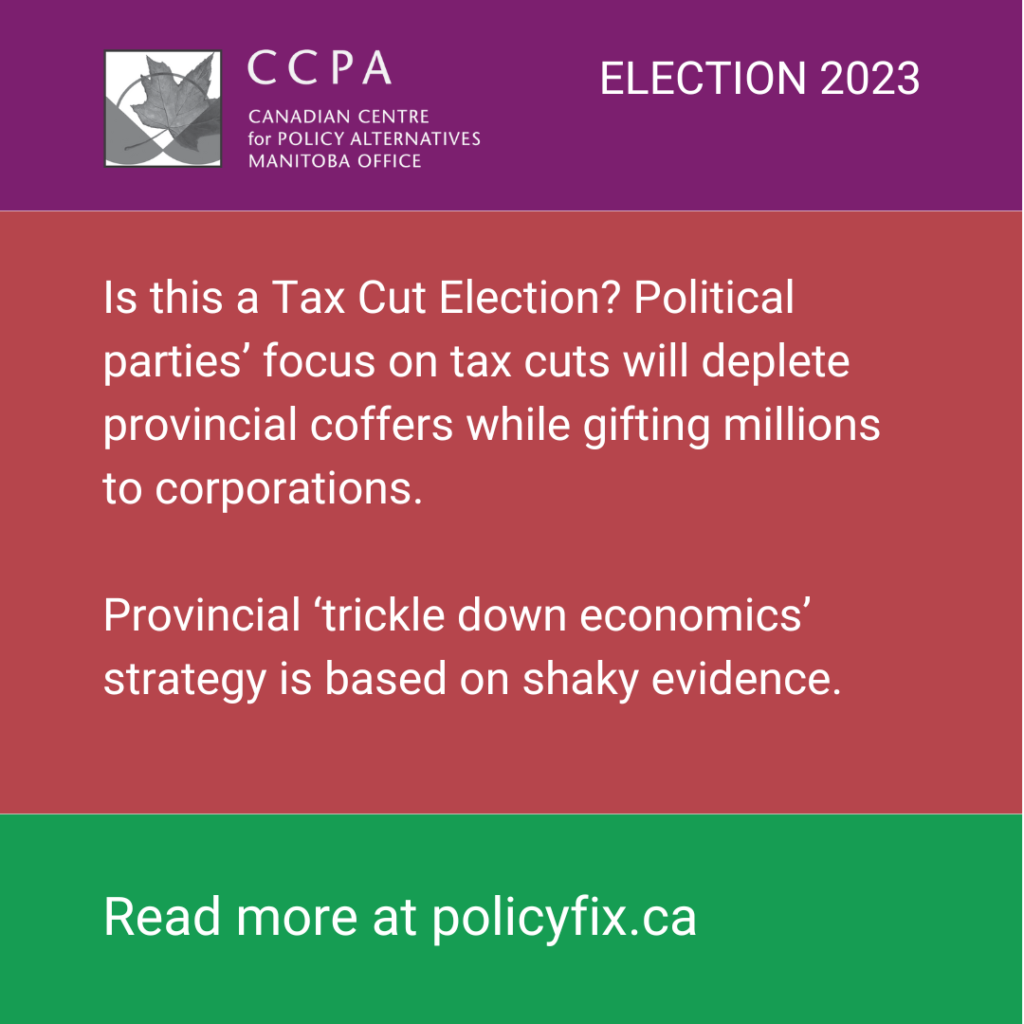September 11, 2023

Provincial ‘trickle down economics’ strategy is based on shaky evidence
For Immediate Release (Winnipeg, Treaty One):
Another tax measure announced today by the Progressive Conservative party brings the tally of tax cuts proposed by the party above $1.2 billion, raising serious questions about how a PC provincial government would cover revenue losses without large cuts to services. The PCs announced they would eliminate the Health and Social Levy (payroll) tax cut over eight years, which would remove at least $440 million dollars of revenue from the provincial treasury once fully implemented in 2031. The Health and Education Levy goes to general revenue to help cover the cost of core services that create a healthy and educated workforce, which businesses require to operate.
Two decades of tax cuts have already significantly reduced the share of taxation Manitoba corporations contribute to provincial revenues. Manitoba is the only province to not have a business tax for businesses with profit below $500,000. The province eliminated the small business income tax rate in 2010. In 2016, the small business limit increased to $450,000 and 2019 is further increased to $500,000. Manitoba corporate tax revenue as a share of GDP is the lowest in Canada.
Decisions to focus economic strategy around tax cuts in this election marks a return to the ideology of ‘trickle down economics’. A review of Alberta’s 2019 attempt to spur economic growth through large business tax cuts found that the strategy delivered no benefits in terms of jobs creation, wage growth, or business investment relative to other Canadian provinces (Stanford 2023). The strategy did, however, hand Alberta corporations the highest profit rates in Canada and increased economic inequality in the province.
Businesses decide to locate in particular provinces based on numerous factors, including services employees require such as quality health care, good schools, access to child care, affordable housing, and quality infrastructure. The tax cuts proposed by the PC party and the NDP (via their support of Budget 23/24’s tax cuts and proposals to temporarily eliminate the provincial gas tax) will decrease revenue needed to fund important public services.
Manitoba requires own-source revenue to restore public services, fight income inequality and prepare for climate change. Under the PCs, the Manitoba government has cut taxes representing $1.6 billion of revenue lost annually since 2016 on corporate, property and regressive personal income tax cuts. During their time in government, the NDP cut revenues amounting to $1 billion per year by 2016 on income tax and property tax reductions (see p. A20 of the Economic and Fiscal Outlook 2016). A further $1.2 billion decline in provincial revenue over the next four years raises serious concerns about long-term financing of core services, particularly in the event of an economic downturn or changes to federal transfers.
The Parliamentary Budget Office noted in 2022 that Manitoba’s provincial finances are already unsustainable due to tax cuts. Changes to federal transfers forecast to begin in 2027 could create large provincial deficits in Manitoba. Another round of large tax cuts should raise red flags for voters, particularly since the evidence that economic growth will make up the difference is so thin.
Provincial own-source revenues (total revenues minus Federal transfers) have declined significantly and are projected to continue falling, from 25.3% in 2007/08 to a projected new low of 15.9% in 2023/24. Federal funding meant to expand provision of social services, is instead, is partially replacing provincial revenues. This places Manitoba in a vulnerable position if a change in government nationally spurs a decrease in equalization payments to Manitoba.
Extensive research shows that corporate income tax cuts on their own do not create employment growth, boost incomes, or spur investment. The failures of “trickle-down” theory of economic development are well documented, and these policies have been largely abandoned by economists and international economic institutions (Dabla-Norris 2015, Quiggin 2012).
Cost of Tax Cuts announced to date, Manitoba Election 2023:
PCs:
Eliminate the Health and Education Levy for businesses – $440 million by 2031
Cut tax rate on first income tax bracket by 50% – $981 Million by 2027 (See further analysis by CCPA MB)
Eliminating the Land Transfer Tax for first time homebuyers – $40 million (CBC)
Seniors property tax deferral – uncosted (Free Press)
NDP:
Temporarily eliminate the provincial gas tax – $140 million (CBC)
Manitoba Liberals:
Repeal 80% of the education property tax rebate – uncosted (CBC)
About:
Canadian Centre for Policy Alternatives is Canada’s leading progressive research institute.
Contact:
Molly McCracken, Manitoba director: Molly@policyalternatives.ca or 204-803-0047
Niall Harney, Senior Economist, niall@policyalternatives.ca or 204-510-7934
Sources:
Dabla-Norris, Era et al. (2015). “Causes and Consequences of Income Inequality: A Global Perspective”. International Monetary Fund. https://www.imf.org/en/Publications/Staff-Discussion-Notes/Issues/2016/12/31/Causes-and-Consequences-of-Income-Inequality-A-Global-Perspective-42986
Office of the Parliamentary Budget Officer (2022). Fiscal Sustainability Report 2022. Ottawa. July 2022.
Stanford, Jim (2023). “The Failures of Trickle-Down Economics in Alberta”. Centre for Future Work. May 2023. https://action.afl.org/wp-content/uploads/2023/05/The-Failures-of-Trickle-Down-Economics-in-Alberta-23MAY23.pdf
Quiggin, John (2012). Zombie Economics: How Dead Ideas Still Walk Among Us. Princeton University Press.
-30 –


